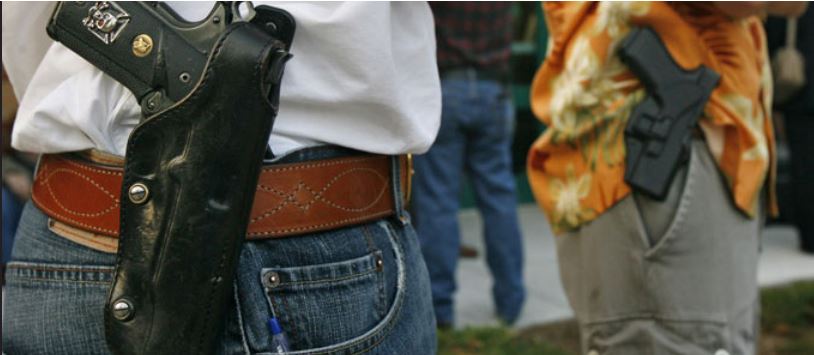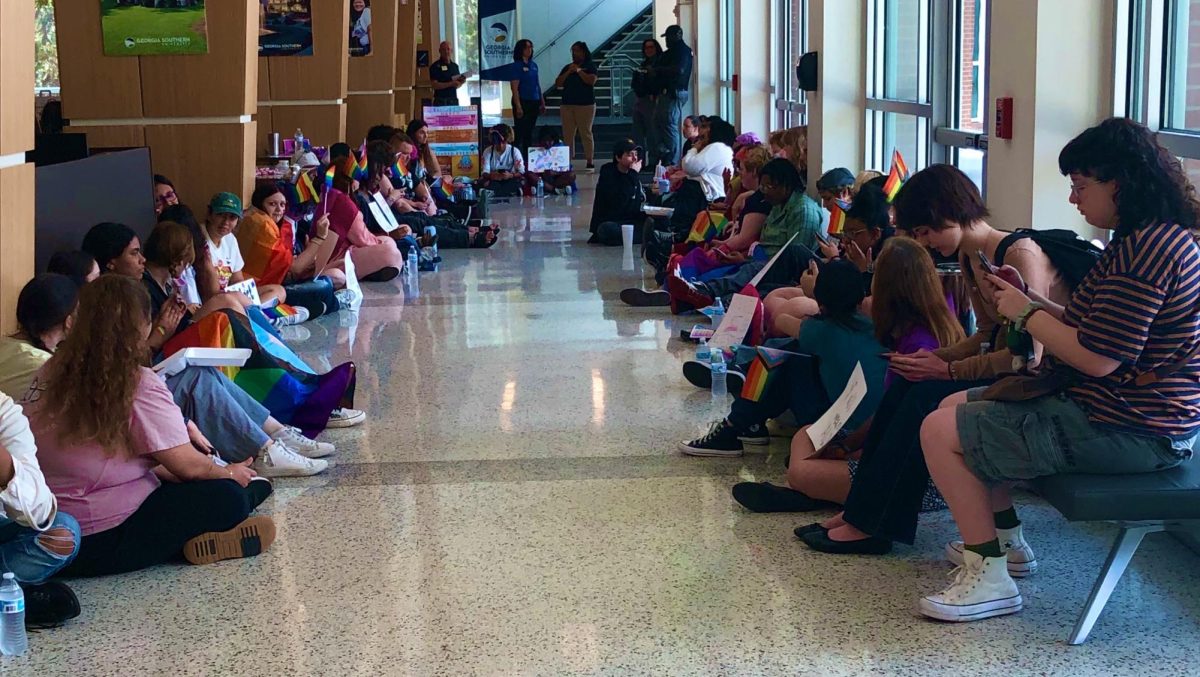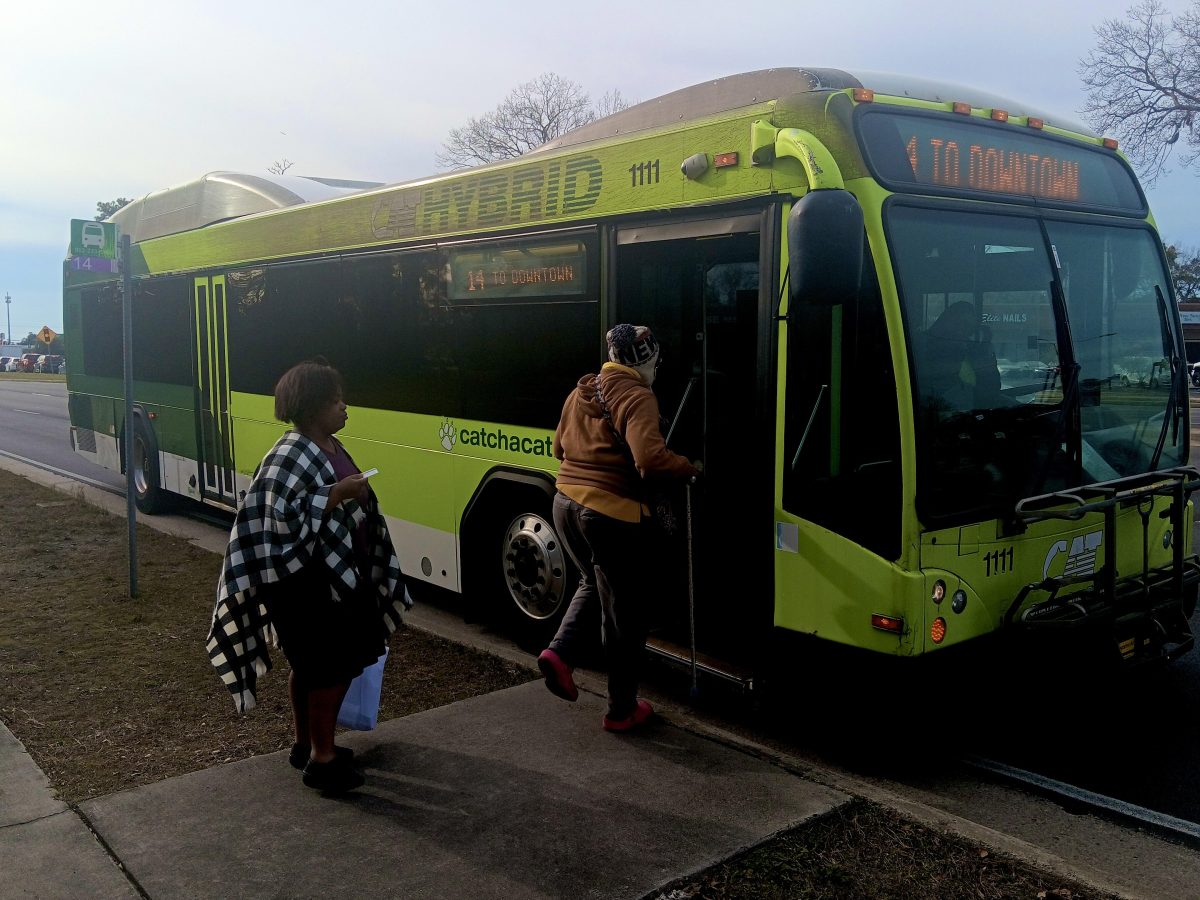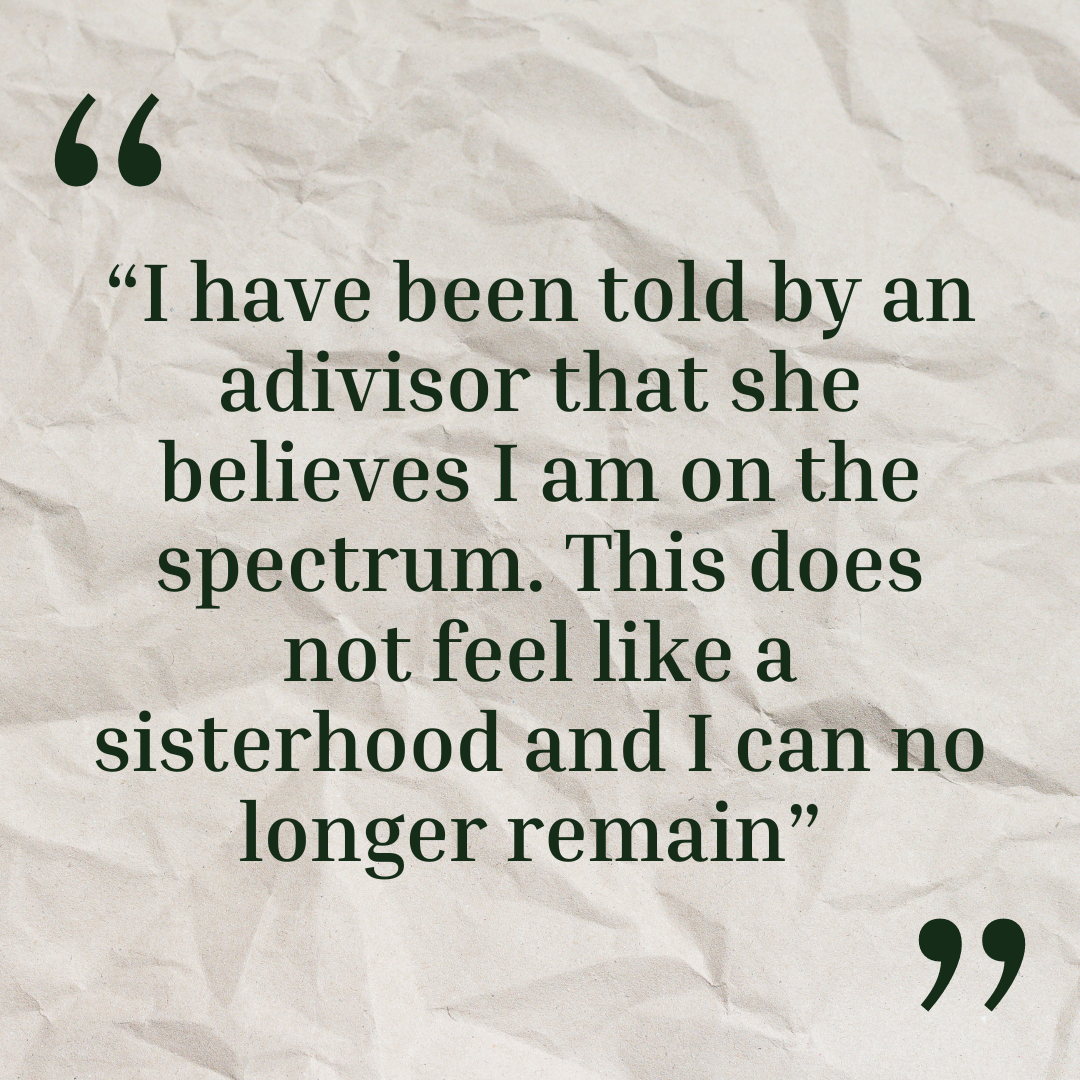
By Emily Smith, Editor in Chief and
Lauren Ashely, Staff Writer
The Georgia Senate this month gave final passage to a bill that would legalize firearms at all public colleges in Georgia. Colleges and universities across the state, including Armstrong, have held forums to discuss details and concerns surrounding the bill.
House Bill 859, yet to be signed by Governor Nathan Deal, would allow persons over the age of 21 to carry a concealed handgun onto Georgia college campuses as soon as July 1. The only locations exempt are dormitories, fraternities and sororities houses and at athletic events.
On March 24, a crowd of mostly professors and university officials gathered in Armstrong’s Ogeechee Theatre for the Campus Carry Forum designed to address questions and concerns regarding House Bill (HB) 859.
President Linda Bleicken announced her viewpoint on the controversial bill: “On Monday, a letter from me was delivered to Governor Deal supporting the current law and asking that it remain so that we not have this new law.”
She went on to say that other University System of Georgia presidents have also submitted similar letters.
According to forum panelist and Armstrong State University attorney Lee Davis, professors could not prohibit concealed firearms in their classrooms, nor could the university opt out or alter the bill’s stipulations.
Many of the professors in attendance were specifically concerned about guns being brought into their classroom.
A student with a gun may force professors to a carry a gun for protection, which is something that most do not wish to do. One professor stated, “the unfortunate part is that we are being forced to make that choice.”
Another choice professors would have to make is whether or not to call the police. Panelist Wayne Wilcox, Armstrong’s Chief of Police, said his squad could not come into the classroom “and detain somebody strictly for the purpose of determining whether or not they have a license.”
“Complaint[s],” Wilcox said, “have to be based upon behavior,” not suspicion of or catching a glimpse of a gun.
Protests against the bill have taken place within the past weeks at Georgia schools, such as the University of Georgia and Kennesaw State University. A list of petitions have been started by students, including Armstrong’s National Association for the Advancement of Colored People (NAACP).
Some students, on the other hand, seem to be in favor of HB 859.
Ethan Pringle, a student in the College of Liberal Arts and Sciences, said “the bill’s intention is to lessen the chances of our school becoming a helpless target to an armed gunman.”
Fellow student Matthew Ferreira also believes that under the current regulations, Armstrong is ill-prepared for a campus shooting.
“Right now, if an active shooter were to come into our school, not a single student or faculty member would be able to defend himself or herself. That is unacceptable. I will feel much more safe with the ability to carry a weapon to defend myself as opposed to being defenseless against an assailant,” Ferreira said.
Neither Ferreira nor Pringle possess a campus carry license. They both intend to get a license and would willingly participate in a free gun safety class if one was offered by the school.
The idea of training teachers and new carriers how to properly carry and fire a gun via a Student Veteran Affairs or campus police training seminar was entertained by all.
The bill also states that the weapons must be concealed. Concealed carry permits require background checks and fingerprinting. The panelists stressed that the majority of students would not qualify for a concealed carry license because they are not 21 years or older. Also, students of age would have to pass a background check, be fingerprinted, pay $37 to the clerk’s office and invest a significant amount of money in a handgun.
Wilcox reminded attendees that “it wasn’t because they didn’t allow guns on campus,” that students, faculty and staff picked Armstrong. “It doesn’t change who we are. It doesn’t change who the organization is,” he said.
Governor Deal has until May 3 to sign the bill or have his authority overridden by a veto. The resulting legislation would become effective on July 1.


















Dan Muller • Apr 8, 2016 at 6:49 pm
Here ya go Chris, with a bonus link or 2.
http://www.cbsnews.com/news/campus-carry-texas-is-big-step-closer-to-bestowing-right-to-carry-concealed-handguns-on-college/
http://www.ncsl.org/research/education/guns-on-campus-overview.aspx
https://csgjusticecenter.org/wp-content/uploads/2014/03/NCSL-Arming-Staff-Brief.pdf
http://www.al.com/news/index.ssf/2014/06/georgia_schools_resist_arming.html
Chris Golden • Apr 7, 2016 at 10:17 am
In the 9 states that don’t criminalize campus carry none of enumerated fears have come to bear any measure of truth. Why is that?
We have decades of data of the actually effect of decriminalizing campus carry by screened law abiding adults. Why would we ignore that? Why indeed because bias, perception and feelings that extend to supposedly “educated” and “intelligent” educators and leaders.
When one ignores fact, trends and attempts to capitalize on minority or rare events and fosters fear mongering this does not benefit our society nor educates the people on risk vs. benefits in order to allow them to make an “informed decision”. To take the step of self-reliance and be prepared to use lethal force when lethal force is not just justified but essential to reducing morbidity and mortality of innocent lives is a large one and should not require permission for a law abiding adult.
So we can restore yet another incremental measure of individual rights to the adult, screened, vetted and finger printed citizen, who historically is not nor has been a threat to “public safety” or double down on the failure of “gun free zones” that really aren’t at least for those who ignore law.
Will honest wisdom prevail? Or will we allow history to repeat itself? Virginia Tech spokesman Larry Hincker praised the defeat of the 2006 campus bill, stating, “I’m sure the university community is appreciative of the General Assembly’s actions because this will help parents, students, faculty and visitors feel safe on our campus.”
They felt “safer” for less than a year when the worst shooting massacre of our nation’s occurred. Seung-Hui Cho, a senior at Virginia Tech, shot and killed 32 people and wounded 17 others in two separate attacks (another six people were injured escaping from classroom windows), approximately two hours apart. This occurred via two separate background checks, one month apart (one gun a month law-later repealed), with a Glock 19, Walther P22 and “normal” capacity magazines of 10 and 15 rounds on a “GUN FREE CAMPUS”.
Feeling safer and being safer are two separate entities, perhaps we will learn from facts and history or not.
Dan Muller • Apr 7, 2016 at 10:10 pm
There are actually over 20 states that do not criminalize campus carry.
Chris Golden • Apr 8, 2016 at 11:21 am
Thank you Dan. I have searched as best I can and several references to 8 then recently 9 with Texas passing campus carry. Do you have a list or link to the 20. I sincerely appreciate it.
Dan Muller • Apr 8, 2016 at 6:46 pm
Here ya go Chris, with a bonus link or 2.
http://www.cbsnews.com/news/campus-carry-texas-is-big-step-closer-to-bestowing-right-to-carry-concealed-handguns-on-college/
http://www.ncsl.org/research/education/guns-on-campus-overview.aspx
https://csgjusticecenter.org/wp-content/uploads/2014/03/NCSL-Arming-Staff-Brief.pdf
http://www.al.com/news/index.ssf/2014/06/georgia_schools_resist_arming.html
jtjathomps • Apr 4, 2016 at 3:26 am
None of this Chicken Little stuff happened in other states where they have campus carry.
Steve Hullett • Apr 4, 2016 at 1:13 am
“President Linda Bleicken announced her viewpoint on the controversial bill…” There is nothing controversial about it. This bill restores a Constitutionaly enumerated right to law abiding citizens, a right that has been stripped from them simply because of location.
“Neither Ferreira nor Pringle possess a campus carry license.” I would think not, as such a thing does not exist. Any Georgia resident over 21 years of age, who is not prohibited by law, can obtain a Georgia Weapons License (GWL).
I fail to undestand the logic of assuming that a law abiding citizen, one who has passed State and Federal background checks, who has no felonies, who has no domestic violence history, and who has no prior drug convictions, would suddenly become a homicidal maniac simply because they are on a college campus. These same GWL holders are your neighbors, your coworkers, parents in the PTA, they go shopping, out to eat, to church….while carrying a weapon….and somhow manage to never commit a crime while doing so.
Pass this Bill, Governor Deal!
Dan Muller • Apr 3, 2016 at 9:21 pm
“House Bill 859, yet to be signed by Governor Nathan Deal, would allow persons over the age of 21 to carry a concealed handgun onto Georgia college campuses as soon as July 1.”
A very important detail is left out of this statement. The person over 21 must also possess a Georgia Weapons Carry License.